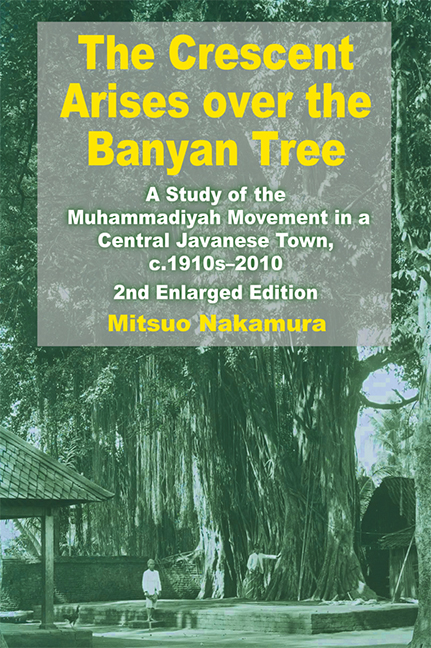 The Crescent Arises over the Banyan Tree
The Crescent Arises over the Banyan Tree Book contents
- Frontmatter
- Dedication
- Epigraph
- Contents
- List of Figures and Maps
- List of Tables
- List of Boxes
- Foreword to the Second Edition
- Preface to the Second Edition
- Foreword to the First Edition
- Preface to the First Edition
- Notes
- Map
- PART I DEVELOPMENT OF THE MUHAMMADIYAH IN KOTAGEDE, c.1910s–1972
- PART II KOTAGEDE REVISITED, 1972–2010
- Bibliography
- Glossary
- Appendices
- Index
- About the Author
Preface to the Second Edition
Published online by Cambridge University Press: 21 October 2015
- Frontmatter
- Dedication
- Epigraph
- Contents
- List of Figures and Maps
- List of Tables
- List of Boxes
- Foreword to the Second Edition
- Preface to the Second Edition
- Foreword to the First Edition
- Preface to the First Edition
- Notes
- Map
- PART I DEVELOPMENT OF THE MUHAMMADIYAH IN KOTAGEDE, c.1910s–1972
- PART II KOTAGEDE REVISITED, 1972–2010
- Bibliography
- Glossary
- Appendices
- Index
- About the Author
Summary
The book before the reader is a study on the development of the Muhammadiyah movement in Kotagede, a small town in the Special Region of Yogyakarta, Republic of Indonesia, over a period of approximately one hundred years from the early twentieth to the beginning of the twenty-first century. The Muhammadiyah, a modernist Islamic social and educational organization, was established in 1912 (1330 AH) by Kyai Haji Ahmad Dahlan (1868–1923), a preacher (khatib) of the Great Mosque of the Sultanate of Yogyakarta. The organization is celebrating its centennial anniversary in 2010 (1430 AH) according to the Islamic calendar.
In 1890, Dahlan went to Mecca for pilgrimage and was deeply impressed by the ideas of such modernist Islamic thinkers as Jamaladdin Al Afghani, Muhammad ‘Abduh and Muhammad Rashid Rida. He felt that the backwardness of the Javanese Muslims and their suffering under the Dutch colonial rule were rooted in the sorry state of Islam in Java, contaminated by syncretism and deviations (bid'ah). So, he began to advocate a return to the pristine teachings of the Qur'an and Hadith, and purification and reinvigoration of Islam through ijtihad (independent reasoning) over taqlid (blind obedience). He brought tajdid (reform) into a number of religious practices including the use of vernacular languages rather than Arabic in Friday sermons and religious propagation (pengajian) to make the teachings of Islam understandable to ordinary Muslims. He also introduced a modern school system for the education of Muslim children, for both boys and girls, in which religious and secular subjects were taught side-by-side. He urged the pious actions in Islamic philanthropy towards the poor and the needy of payment of religious taxes (zakat), contribution of sacrificial animals (qurban or korban), voluntary donations of money (infaq or infak and sadaqa or sadaka, sedakah), and institution building for educational and social welfare through permanent donation of property (waqaf or wakaf).
Over the past 100 years, the Muhammadiyah has grown nationally to be the second largest Islamic civil society organization in Indonesia, claiming some 30 million members and supporters. The largest is Nahdlatul Ulama (NU), a traditionalist organization, which claims around 40 million followers.
- Type
- Chapter
- Information
- The Crescent Arises over the Banyan TreeA Study of the Muhammadiyah Movement in a Central Javanese Town, c.1910s-2010 (Second Enlarged Edition), pp. xxv - xxxiiPublisher: ISEAS–Yusof Ishak InstitutePrint publication year: 2012
